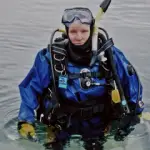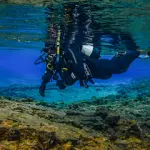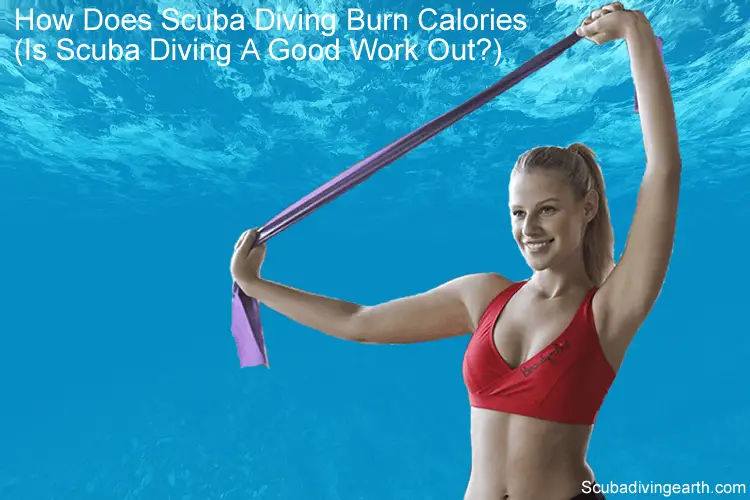
How does scuba diving burn calories and is scuba diving a good workout to loose weight?
Why is it that you don’t see any over weight scuba diving instructors? Is this an indication of how scuba diving burns calories?
But scuba diving is a slow moving activity, so how is it that scuba diving burn calories? Scuba diving burns calories mainly due to heat loss as water dissipates heat from your body 25 times faster than air due to its greater thermal conductivity. Scuba diving also burns calories from low impact exercise in a weightless environment. The combination of both is up to 600 calories per hour.
The best way to do more diving is to book yourself on a scuba diving liveaboard. You can check the latest and best deals on liveaboards using the following window:
How does scuba diving burn calories?
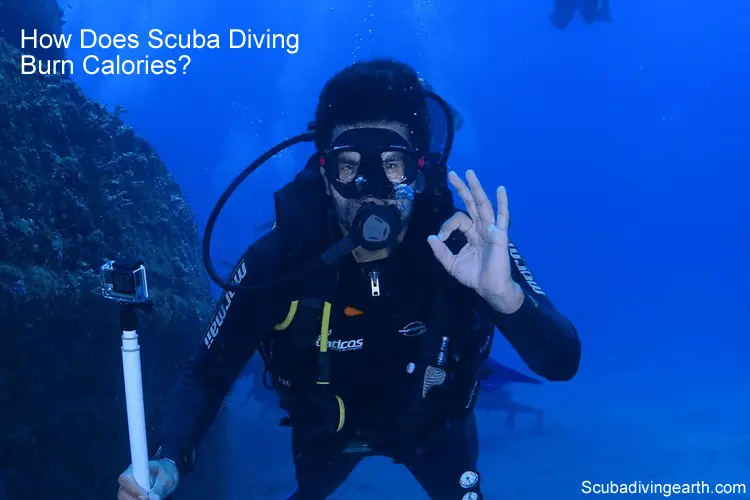
Water is roughly 800 times more dense than air. Which means it takes much more effort for any movement. Whilst scuba diving is a slow moving sport, which is about conserving your air, energy is still needed to swim.
Pro tip: You may want to read about how I conserve my air with these 22 pro tips.
Many beginner scuba divers are surprised by how much energy is consumed when scuba diving. Scuba diving isn’t like going for a jog or visiting the gym, as you hardly ever get out of breath on a dive. Most scuba divers are hungry after a dive. You might like to read about why you get hungry scubas diving too. Plus find out the best snacks to take on a dive.
Scuba diving burns energy and calories in the following ways:
- Finning (which will be increased in currents)*.
- Moving heavy dive kit about.
- Getting on and off the boat.
- Keeping warm.
* Normally you swim with the current when scuba diving, but sometimes it’s necessary to swim against a current.
Out of the above list of calorie burners, number four is the biggest drain on your body’s energy resources.

Why does scuba diving burn calories?
The reason for the high calorific burn rate when scuba diving is down to the higher thermal transfer properties of water. In water we loose heat 25 times faster than on land. The body burns on average 70% of its daily calorie requirement keeping the body warm.
Which is why the calorie burn rate when diving is that much higher. In colder waters a wetsuit or drysuit is a must to keep warm.
The human body seeks to maintain a core temperature of between 36C (96.8F) to 37C (98.6F). When scuba diving the body needs to use more energy to maintain the body’s temperature. Hence the increased calorie burn.
You may be interested to learn that your Basal Metabolic Rate is the number of calories required to keep your body functioning at rest. I discovered this great Basal Metabolic Rate (BMR) calculator by Active.com (Thank you Active.com).
Basal Metabolic Rate Calculator
| Gender | Age | Height | Weight | Calorie Burn* | BMR | BMR % of Calorie Burn |
|---|---|---|---|---|---|---|
| Male | Age 40 | 5'10" | 196 lbs | 2,655* | 1,905 | 71.8% |
| Female | Age 40 | 5'5" | 169 lbs | 1,990* | 1,508 | 75.8% |
Why do you lose body heat faster in water?
According to US Search and Rescue Task Force water conducts heat away from the body 25 times faster than air due. This is due to its greater density.
Also, did you know that water below 21C (70F) is regarded as dangerously cold. If you stay in water this cold for too long without adequate thermal protection could lead to hypothermia.
Hypothermia occurs when your body loses heat faster than your body can make it.
On land body temperature can drop to low levels in air temperatures of around 10°C (50°F). But in water the same can happen in temperatures of 21°C (70°F) or below.
Therefore despite the fact that scuba divers wear exposure suits, significant heat loss still occurs. Our body’s Non-Shivering Thermogenesis increases. Our Basal Metabolic Rate increases, and as a result we burn more calories.
How many calories are burned scuba diving?
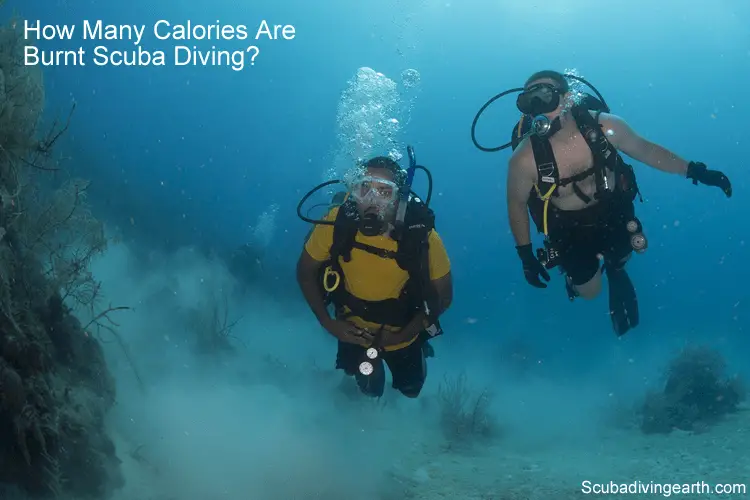
The average scuba diver will burn between 400 and 700 calories per dive. The number of calories burned is affected by:
- Water temperature;
- Duration of the dive;
- The level physical exertion; and
- Type of exposure suit worn.
It’s estimated that as many as 600 calories are burned per hour scuba dive. Which exposure suit your wear, which can be a wetsuit or dry suit, will affect how much heat loss you suffer. The more heat loss there is, the greater the number of calories burned.
More Reading: What is the difference between a wetsuit and a dry suit?
In comparison, and according to Healthline, the average person burns around 114 calories running a mile. Therefore, in order to achieve the same calorie burn result as scuba diving you’d have to run over 5 miles.
I know what I’d rather do. I hate running and love scuba diving, so the choice is easy.
How can I burn 500 calories a day?
The question of “how can I burn 500 calories a day“; Why not learn to scuba dive. But if you ask how you burn 1000 calories a day? First get your scuba diving certification, and then go for two scuba dives a day instead!
Scuba diving for weight loss – does scuba diving burn fat
Scuba diving does burn fat and could be regarded as an alternative weight loss program. Diving in cold water with the appropriate wetsuit or drysuit will increase fat burn too.
As already discussed, scuba diving burns plenty of calories despite the fact that it’s a low impact sport. So why not include scuba diving as a weight loss program and have fun and excitement whilst doing so.
However, with any weight loss of fat reduction you will need to eat healthily too. Your calorie burn rate will increase as a result of scuba diving. But if you increase your calorie intake at the same time, it’s likely that one will counter the other.
Scuba diving in cold water is your answer to burning those calories!
The answer to burning those extra calories is to dive in cooler waters.
The best solution to burning the maximum amount of calories would be to scuba dive with a thinner exposure suit in cooler waters.
How many calories do you burn scuba diving in cold water?
You are likely to burn up to 700 calories per hour while scuba diving in cold water.
The number of calories you burn scuba diving in cold water will be more than in warmer waters. Plus it does depend on what type of exposure suit you’re wearing too.
How many calories do you burn in an hour of snorkeling?
Arguably, the number of calories you burn in an hour of snorkeling would be similar to scuba diving.
Physically you are finning like you are scuba diving, although you don’t have the same weight of equipment to carry. However, you are immersed in water so conductivity of heat and the loss thereof will be similar.
If you are not able to scuba dive, then consider snorkeling as another weight loss option to burn extra calories.
I hope you enjoyed this article about how does scuba diving burn calorie
I’d love to hear from you. Tell us about your adventures of diving and snorkeling, in the comments below. Please also share your photos. Either from your underwater cameras or videos from your waterproof Gopro’s!
If this article hasn’t answered all of your questions. If you have more questions either about snorkeling or scuba diving (or specifically about how does scuba diving burn calories), please comment below with your questions.
There will also be many more articles about scuba diving (and snorkeling) for you to read and learn about these fabulous sports.
Have fun and be safe!


